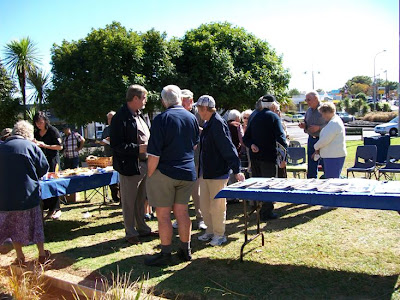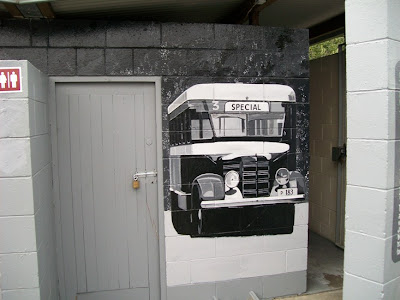It was a gorgeous day in Avondale this morning. Around 40 people turned up at the adjoining Avondale Memorial Park to our little do in honour of Avondale's oldest member of the community -- St Ninian's Church. How many 150 year old buildings have a crowd of people boisterously singing Happy Birthday to them, with three hip-hip-hoorays? Come to that, how many heritage buildings have special handmade birthday cards put together for them?
This huge card was put together by "the Akozone Homework Centre students at Avondale Community Library, April 2010". Utterly, utterly brilliant. You should have seen the faces of the congregation members who used to go to St Ninian's pre-1984 when they saw what youngsters had done in honour of the old building. Cool stuff.
Our Avondale Community Board granted the Avondale-Waterview Historical Society (my home society) funds to print 200 copies of a commemoration booklet for the 150th -- and these were officially launched today. Free. Needless to say, almost all were snapped up, by those attending for themselves and for others not there but who wanted to be.
The community pulled together, and all refreshments were provided by those attanding who could do so. Some even brought chairs. Auckland City Council staff and the local community centre helped with chairs and tables as well.
A "Happy Birthday" appeared on the side of the building ...
... and Sunita Kashyup of Auckland City Council provided a couple of these cool temporary signs. One's on the picket fence outside the church, where I'd like to see a permanent one later this year, and the other's with the local library, who will be putting together a display for our church building later on.
Here's the text of my speech of welcome and introduction at the function today, after a brief word and greeting by Rev Margaret Martin who had connections with the old church..
Speech given by Lisa Truttman
President, Avondale-Waterview Historical Society
at Avondale Memorial Park
8 April 2010
Welcome ladies, gentlemen, friends, to this the 150th birthday of Avondale’s St Ninian’s Church, the old Whau Presbyterian Chapel. A special welcome from the Avondale-Waterview Historical Society to Wayne Coe, President of the Avondale Senior Citizens, and the leaders of our neighbouring historical societies here – West Auckland (Trevor Pollard) and Blockhouse Bay (Keith Rusden). Members of the Avondale Union Parish are here today, including Rev Margaret Martin and Rev Vai Ngahe, welcome. A welcome as well to members of the Avondale Community Board, and to Sunita Kashyup of Auckland City Council.
From my insisting (hopefully!) that this sesquicentenary landmark should be noted to today’s gathering -- has involved more than just one lone Avondale history buff.
My thanks to the members of my home historical society for backing this idea solidly right from the beginning. To the Avondale Community Board for their generous grant toward the printing of the first 200 of the commemorative booklet – which are free, while stocks last (if there is a demand after that, we’ll see about printing some more.)
Special thanks to Wayne Coe, who took up the challenge of being a face of the caring community for St Ninians in the recent Aucklander article, a community leader who cares passionately about the future of our 150 year old, and who worked hard to help with preparations for today. Felice Coiffure hairdressers across the road helped us with providing hot water for the morning tea.
Thanks also to the Avondale Business Association who have, since 2001, been staunch supporters of Avondale’s heritage.
Thanks to Sunita Kashyup – Sunita, believe me, the community of Avondale welcomes you and appreciates the hard work you and your team at Community Development do for us.
Thanks to all of you who have helped out with refreshments – and simply being here, to show your support for the oldest member of our community.
The history of our chapel is in the booklets.
We have Avondale’s earliest settler from 1843, John Shedden Adam, to thank for the chapel being where it is, although in truth he sold the land for a pittance to the Presbyterians because the line of the Great North Road cut off this part of his Allotment 13 from the rest across the road in the mid 1850s creating an odd triangular piece of land – and the Provincial Council only finally settled with him in 1858.
We have the Presbyterian parishioners to thank for the funding of the building, the provision of kauri timber from the Waitakeres, building it from November 1859 in howling storms, and the opening of it on 8 April 1860.
This is our first church, and this is also our first school, right from April 1860. Few buildings have survived the test of time where we can still say – this is where the children of the district, a huge district which included West Auckland, parts of Mt Albert, and up to Pt Chevalier, -- this is where the children came to learn. Even the cherished old buildings at the Avondale Primary School are now no more but this one – this building still stands.
Long may it continue.
In this building, people learned, people worshipped, people celebrated, people were married, and people were farewelled, either due to their return back to the Old Country, or to an eternal rest here. Through the years, the Whau Presbyterian Chapel, Avondale Presbyterian Church, St Ninian’s Church, and later community centre, has endured. It was shut up and closed for a few years after it ceased to be a church in 1984, but it reopened to Avondale.
Now, it is shut up again – and as those before us in the 1980s kept the memory of how important the building is to our community’s story, its past, present and future alive – those of us who care today should do the same, until we can see the building reopened to Avondale and the community once more.
If anyone would like to be kept up-to-date, as far as my society can find out from Auckland City Council and its successor agency what is planned for the building, there’s a book here where you can put your names down to receive a newsletter, irregular frequency, so you can keep in contact with us. We’ll let you know, for instance, when (hopefully) a permanent commemorative sign is placed on the fence marking the importance of 2010 for St Ninians. Even better – we’ll let you know when the building is to be reopened.
Let’s hope this is not the last of the birthdays for our St Ninian’s church.
























































